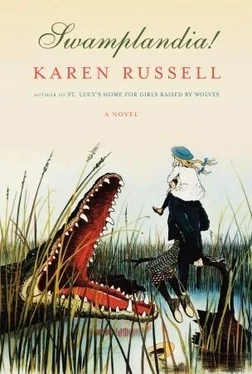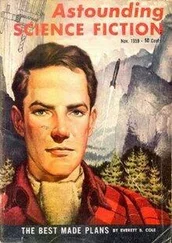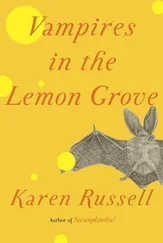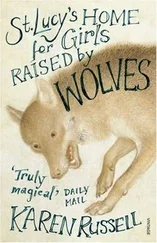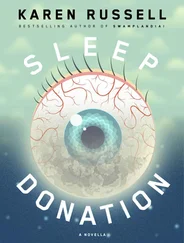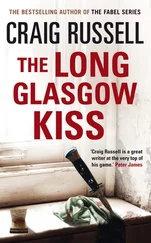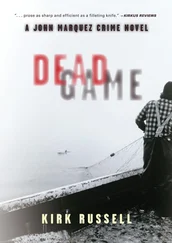The farms came first. The Seths’ country gave way to green and yellow tractors that looked like imperial carriages on their huge tires, and great gusty sprinklers throwing water everywhere. We passed the last gas station before the city began in earnest and Osceola started to cry a little. I leaned over her and pushed the lock down on the car door.
The whole time I was thinking about the buoyancy that saved me. I know that I am a pretty biased interpreter of the events that led to my escape, but I believe I met my mother there, in the final instant. Not her ghost but some vaster portion of her, her self boundlessly recharged beneath the water. Her courage. In the cave I think she must have lent me some of it, because the strength I felt then was as huge as the sun. The yellow inside you that makes you want to live. I believe that she was the pulse and bloom that forced me toward the surface. She was the water that eased the clothes from my fingers. She was the muscular current that rode me through the water away from the den, and she was the victory howl that at last opened my mouth and filled my lungs. I didn’t want to tell my sister anything about this in the Pelkises’ car — I didn’t see how I could manage it with words — but I wished I could at least give Ossie a picture of where I had been, what had been in me. I wished she could bob with me for one second in that air. Black bay trees had lined the sky behind the lake and I was furiously alive around the bubble of our mother.
Was that fullness what Ossie had meant when she talked about her possessions? If so then I had been very wrong, I decided. I was wrong to have laughed at her in our bedroom, in the beginning, back when we’d said that her ghosts weren’t real, or her love.
The road spun behind us like something the car was secreting, yards and yards of black filament. I reached over and squeezed my sister’s hand.
“Hey,” I said. “I believe you.”
The bowling lanes at the Bowl-a-Bed hotel stay open until 2:00 a.m. From the lobby, you could hear the belly-growl of the balls hurtling down the lanes and the clatter of the pins. The Bowl-a-Bed’s bellhop and concierge was a ghoulish young man wearing orange-and-ruby bowling shoes on his size 13 feet. He was a kid, younger than Kiwi, with braces and thick black eyebrows, eyebrows so muscular and expressive they looked almost prehensile to me. They shot up when he saw us.
Ossie and I stood before him with mud-stiffened hair falling into our burned faces. I was shivering inside the ranger’s long T-shirt, and she had on one of Mrs. Pelkis’s kitten-printed nightgowns. Our faces in the lanes 1–9 scoreboard glass looked sewn onto our necks with scratches. Kiwi at least was wearing zippered pants.
“No bags?” the bellhop asked us with a practiced little smirk. His big shoes waggled on the desk.
“Fuck you, clown,” said my brother with astonishing ease. Ossie and I exchanged glances; he’d lost his accent. “Tell us where Samuel Bigtree is staying.”
The Chief was in room 11, just behind the last gutter-ball alley. This would have warranted a joke at some earlier Bigtree epoch but we were BE now, Beyond Exhaustion, and I just wanted to see my dad. The stunned bellhop had given Kiwi a little key, which he turned in the pale blue door to room 11 with a just-audible click.
“Stee-rike!” Kiwi whispered. Then he called out, “Dad. It’s us.”
On the car ride over, Kiwi had told me in a slow and urgent voice that he was sure the park would go into foreclosure. We would lose our home, the Seths. But it was going to be okay, he kept saying, it would really be okay, because he was almost a pilot and the Chief had a job and we would find an apartment on the mainland …
My father’s face filled the door frame and his shock was a wonderful thing to behold. The whole hotel was filled with bowlers’ thunder at that hour. Pins were falling everywhere around us and I watched my dad’s eyes widen to take us in. When my father stepped forward it didn’t matter that we were nowhere near our island. All of us, the four of us — the five of us if you counted Mom inside us — we were home. We were a family again, a love that made the roomiest privacy that I have ever occupied.
“Good night, Ossie.”
“Good night, Ava.”
After a little while I could hear my sister breathing beside me. My father and my brother were snoring in a duel or a duet on the other side of the wall. There had been, as you might imagine, quite a scene between them. Kiwi told us that he’d been working at the World of Darkness for two months and this fact didn’t make a dent. The Chief, holding Osceola, had thanked and thanked my brother for finding her until Kiwi grew embarrassed. He pretended to hawk up a wad of phlegm so that he had an excuse to grab tissues for his eyes.
I’d told the Chief about a dream I’d had on Swamplandia! — a great tree had swallowed him, his knuckles sunk into the tree bark — and he listened with such a frightened, pained expression that I stopped talking. So I didn’t tell my dad about the Bird Man, or Louis Thanksgiving, or the red Seth, or Mama Weeds. What we did talk about was Mom: “I found her dress out there, Dad. I found it, but I lost it again. I think Mom was with me when I battled the Seth …”
The Chief gave me an anguished look. His hand gripped my forearm too tightly, as if he were afraid that any one of us might flash without warning from the room.
“That’s okay. That’s okay, Ava. They found you, your brother found your sister, that’s much better than an old dress, I’m sure.”
But that night the Chief wasn’t in a talking mood. He looked huge and sad on the horned edge of the hotel bed, which had that goofy look of all “fancy” motel furnishings, cheap wood with stupid designs. The wallpaper nudged its quiet spirals upward toward the ceiling fan. We all looked caged in that hotel room. We watched a sitcom on TV and whenever the canned laughter tumbled into the silence of the room, I wanted to roar. Turn it off , I thought, but we were all a little afraid to. We watched the TV family speak their lines to one another as if we were trying to remember how to do it, talk. One on one we probably could have spoken, but the four of us together went mute.
“Did you want to go bowling, girls?” the Chief said at one point, his voice unnaturally loud and cheerful. “Ten free frames. There’s a coupon for a game on the desk, comes with the room …”
“No thanks,” we said in one voice. Ossie didn’t have a change of clothes, she said.
“Where’s your purple skirt?” I asked, gulping against an icy vision of the clothesline. “Where’s Louis’s jacket?”
“I don’t know.” She looked at me strangely. “Back in the swamp, I guess — I lost a bag overboard on the second day.” I started to tell her about Mama Weeds, stopped. Now that I was fed and watered and sitting on bedsheets, that whole part of my journey seemed filmy, impossible. Already I’d lost my pet alligator, Louis’s jacket, Ossie’s ribbon, Mom’s dress; I was afraid that if I shared this out loud I’d lose even the story.
The Chief made many weary, angry phone calls about the day’s events to “straighten these mainlanders out.” News stations were desperate to talk to my brother, Dennis Pelkis said on the telephone—“Hell’s Angel strikes again!”—but Dennis reported proudly that he wasn’t giving them our number. Then the Chief had to set up a meeting with the ranger who found me and a social worker for Monday, at some foreboding address inside the cold stones of downtown Loomis.
No, it turned out the Chief wasn’t angry at me at all. Not for a second, he said, not even when I lowered my voice and explained to him that I had lost Ossie. When I asked him about Swamplandia! and foreclosure and the Seths and his mainland job, he didn’t exactly answer. He was very proud of us, was his reply, the tribe of us. “We are going to the island tomorrow,” he promised. “We’ll put everything in order.”
Читать дальше
